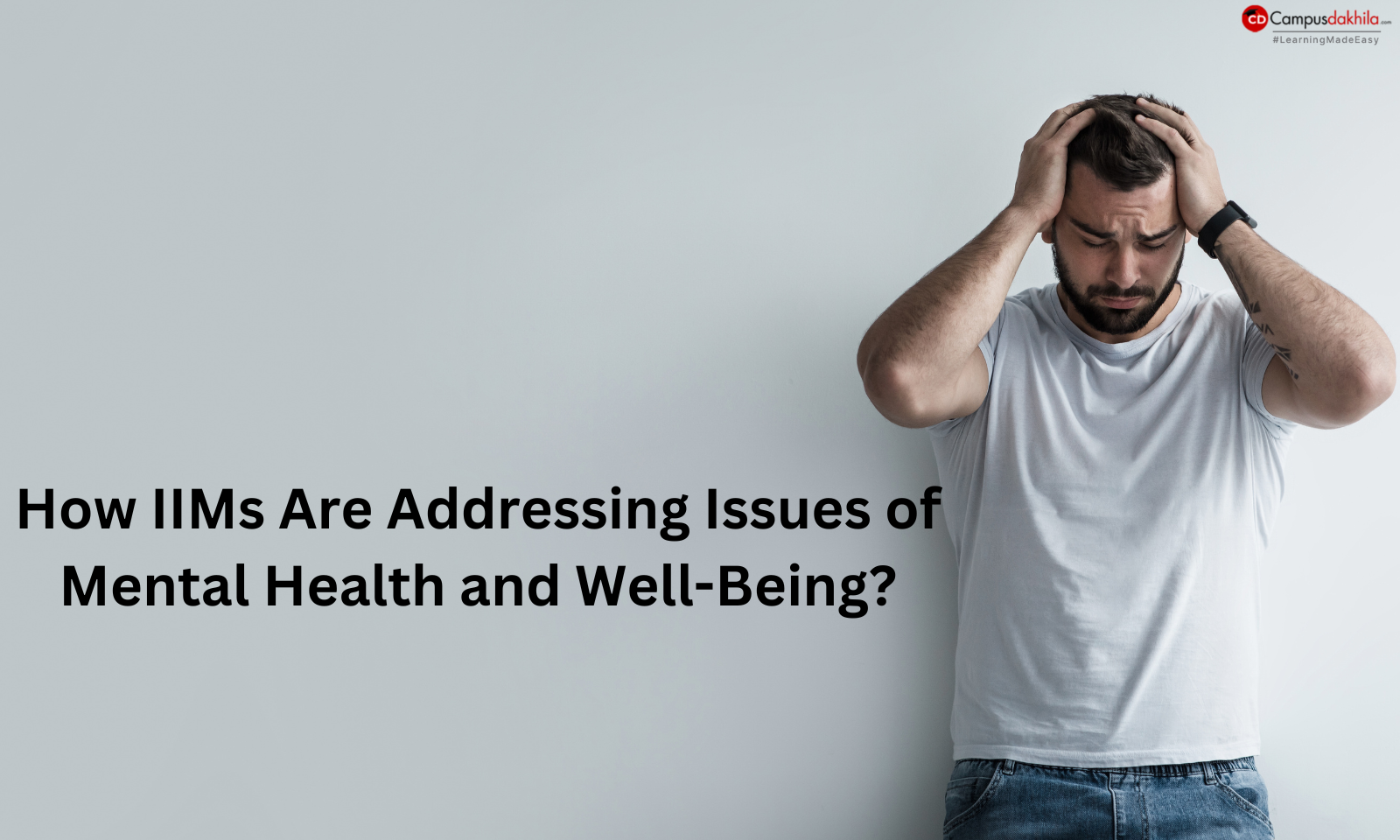
- 1. Understanding the Need for Mental Health Support
- 2. Incorporation of Counselling Services
- 3. Promoting Peer Support Systems
- 4. Mental Health Workshops and Awareness Programs
- 5. Integration of Well-Being Courses and Mindfulness Practices
- 6. Anonymous Feedback Mechanisms and Mental Health Helplines
- 7. Faculty Sensitization and Support
- 8. Flexible Academic Policies and Extensions
- 9. Collaboration with External Mental Health Organizations
- 10. Fostering a Supportive Campus Culture
In recent years, mental health and well-being have become focal topics within educational institutions across the globe. India’s top business schools, the Indian Institutes of Management (IIMs), are no exception. With intense academic pressure, career expectations, and the social challenges associated with the pursuit of excellence, the IIMs have recognized the need to create supportive environments that prioritize the mental well-being of their students. Here’s how IIMs are actively addressing issues of mental health and building a holistic ecosystem for student support.
1. Understanding the Need for Mental Health Support
The life of an IIM student is rigorous and challenging, with continuous assessments, competitive pressure, and the anticipation of top-tier job placements. The result is that mental health issues, such as stress, anxiety, and burnout, often arise. Recognizing the severity of these concerns, IIMs have taken proactive steps to address the unique pressures their students face. Their initiatives go beyond providing basic Counselling; they are building comprehensive support systems that consider every aspect of a student’s well-being.
2. Incorporation of Counselling Services
To offer direct mental health support, many IIMs have established on-campus Counselling centers. These centers are staffed with trained mental health professionals who provide individual Counselling sessions to students facing academic or personal stress.
For instance, IIM Ahmedabad has set up the Student Personal Counselling Services, which offers confidential Counselling sessions for students seeking support. Similarly, IIM Bangalore has partnered with professional counsellors to provide on-campus and telephonic Counselling options. By making Counselling easily accessible, IIMs are reducing the stigma around seeking mental health support and promoting an environment where students feel comfortable reaching out.
3. Promoting Peer Support Systems
One unique approach taken by IIMs is the establishment of peer support groups. Peer support groups, such as the ones at IIM Calcutta, help foster an environment of trust and understanding, enabling students to openly discuss their challenges. These groups are generally composed of students who have received training in basic Counselling skills and are capable of providing empathetic listening and guidance to their peers.
Peer support programs play a critical role in bridging the gap between formal Counselling and informal support, allowing students to address minor issues before they escalate. By fostering a culture of empathy, these programs also work to create a more understanding campus community.
4. Mental Health Workshops and Awareness Programs
Several IIMs regularly host workshops and seminars focused on mental health awareness and stress management. These events feature industry professionals, psychologists, and wellness coaches who educate students on effective coping strategies. Topics covered range from mindfulness and meditation techniques to time management, sleep hygiene, and work-life balance.
For example, IIM Lucknow has implemented the “Mental Health Awareness Week,” which includes workshops, talks, and interactive sessions on mental wellness. These workshops serve as preventive tools, providing students with practical strategies to manage their mental well-being amid the demanding academic environment.
5. Integration of Well-Being Courses and Mindfulness Practices
IIMs are also exploring the integration of well-being into their curricula. Programs at IIM Indore and IIM Bangalore include modules on emotional intelligence, self-awareness, and stress management as part of their academic offering. These courses are designed to build resilience among students and equip them with skills to better manage stress in personal and professional settings.
Mindfulness practices, like meditation and yoga, are being encouraged on many campuses. IIM Kozhikode, for instance, offers yoga classes to students, helping them connect with their inner selves and gain clarity of mind. These practices contribute to the overall mental and physical well-being of students, offering them tools to handle high-pressure situations with a calm and focused mindset.
6. Anonymous Feedback Mechanisms and Mental Health Helplines
One of the critical components of a supportive environment is the ability for students to provide feedback without fear of judgment. Recognizing this, several IIMs have introduced anonymous feedback systems where students can share their concerns, stress levels, or any issues they might face. These systems help the administration gain insight into the mental health status of students and understand specific areas that require intervention.
Additionally, helplines that operate around the clock have been set up at some campuses, allowing students to reach out whenever they feel overwhelmed. These helplines provide an accessible first line of support, ensuring that no student feels isolated or unsupported.
7. Faculty Sensitization and Support
The role of faculty is paramount in addressing mental health concerns. Many IIMs are implementing programs to sensitize faculty members to the mental health needs of students. Workshops and training sessions provide professors with the knowledge to identify signs of mental distress and guide students toward appropriate resources. Faculty members at IIMs like IIM Udaipur are encouraged to create an environment where students feel comfortable approaching them for guidance on managing their academic and personal pressures.
Through these initiatives, faculty play a critical role in creating a compassionate academic setting that promotes mental well-being alongside academic excellence.
8. Flexible Academic Policies and Extensions
IIMs understand that rigid academic structures can sometimes exacerbate mental health issues. To alleviate pressure, several institutions now offer flexible academic policies, including the option to take breaks or defer assignments in cases of mental health crises. These policies demonstrate that academic rigor need not come at the cost of a student’s well-being.
IIM Shillong, for instance, allows students to take time off if they face severe stress or mental health challenges, giving them the chance to recover and return to their studies when they are ready. By acknowledging mental health as a valid reason for academic leniency, IIMs are taking significant steps toward normalizing mental wellness in academia.
9. Collaboration with External Mental Health Organizations
To provide students with access to a wider range of resources, some IIMs have partnered with mental health organizations. IIM Ranchi, for example, collaborates with mental health NGOs to offer specialized services like group therapy and mental wellness workshops. These partnerships bring in expertise that might not be available within the campus and allow students to benefit from a diverse set of mental health resources.
10. Fostering a Supportive Campus Culture
Lastly, IIMs are making a concerted effort to foster a supportive and inclusive campus culture. Events that promote social interaction, relaxation, and community building help students unwind and strengthen social bonds. Through celebrations, cultural events, and club activities, students find avenues to disconnect from academic pressures and enjoy the camaraderie of their peers.
Many IIMs, such as IIM Raipur, promote a balanced lifestyle through initiatives that encourage students to participate in sports, arts, and extracurricular activities. This balance of work and play is essential for maintaining a healthy state of mind, especially in a high-stakes academic setting.
As centers of academic excellence, IIMs are setting a strong precedent by taking proactive steps to address the mental health needs of their students. With Counselling services, peer support systems, flexible policies, mental health workshops, and a supportive campus culture, these institutions are creating an environment that fosters holistic well-being. By emphasizing mental health as part of the educational experience, IIMs not only help students succeed academically but also equip them with the emotional resilience needed to thrive in the world beyond their academic journey.
Through these efforts, IIMs demonstrate a commitment to nurturing well-rounded individuals who understand the importance of mental wellness. As other institutions look to address similar issues, the measures taken by IIMs serve as a model for fostering a more supportive and empathetic educational ecosystem across India.
Any question in your mind?
Connect to our counsellor: 8826807515












